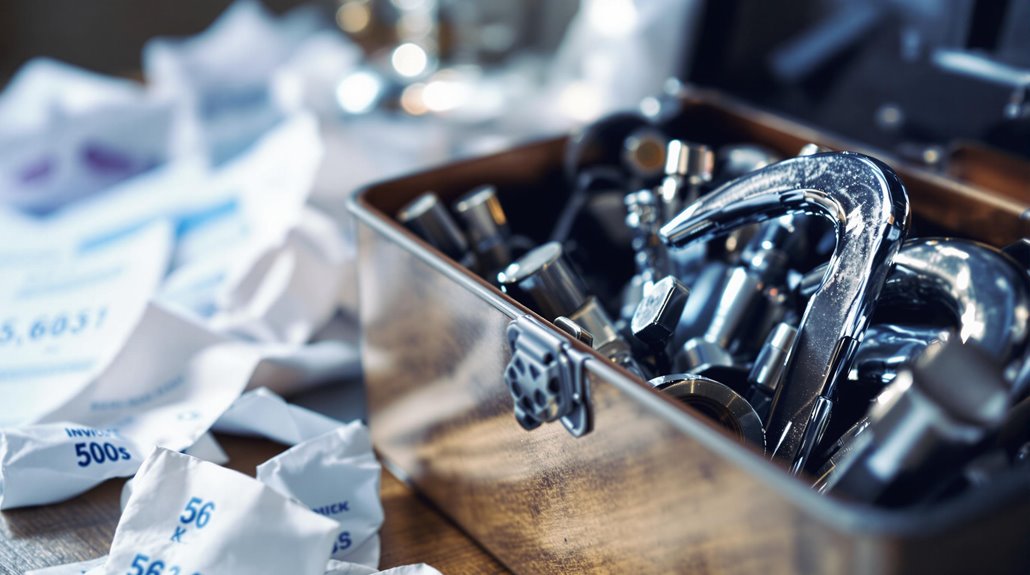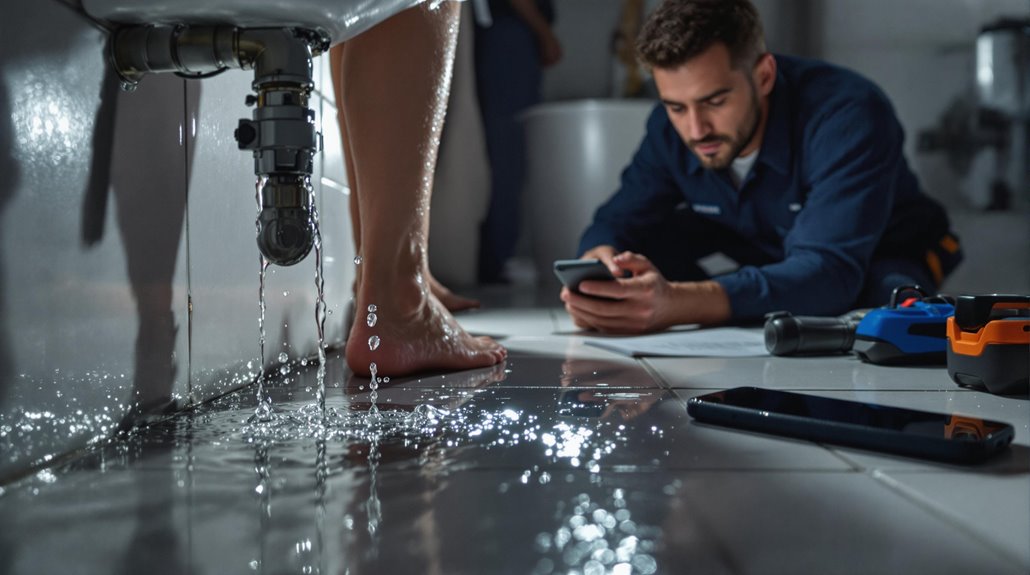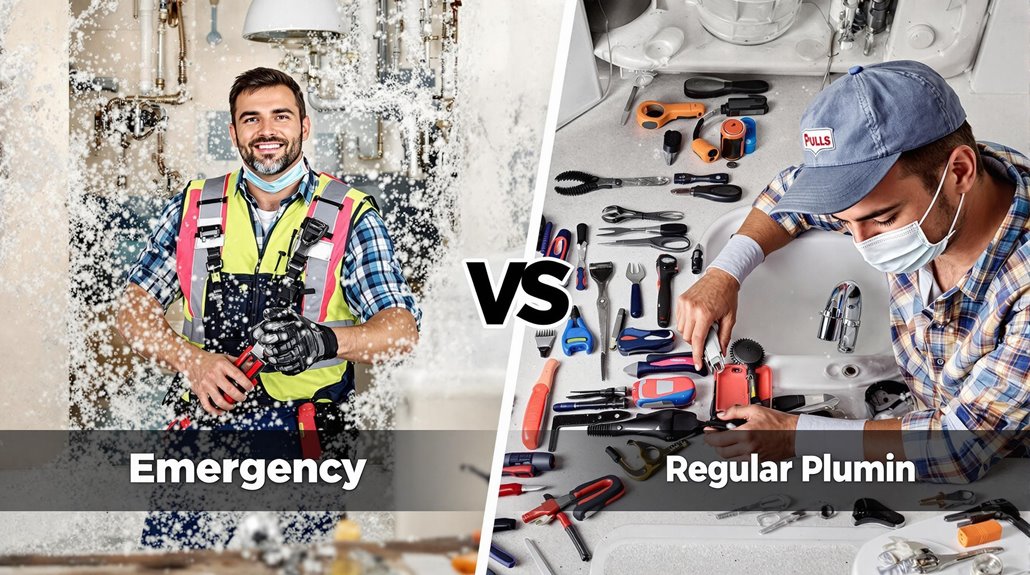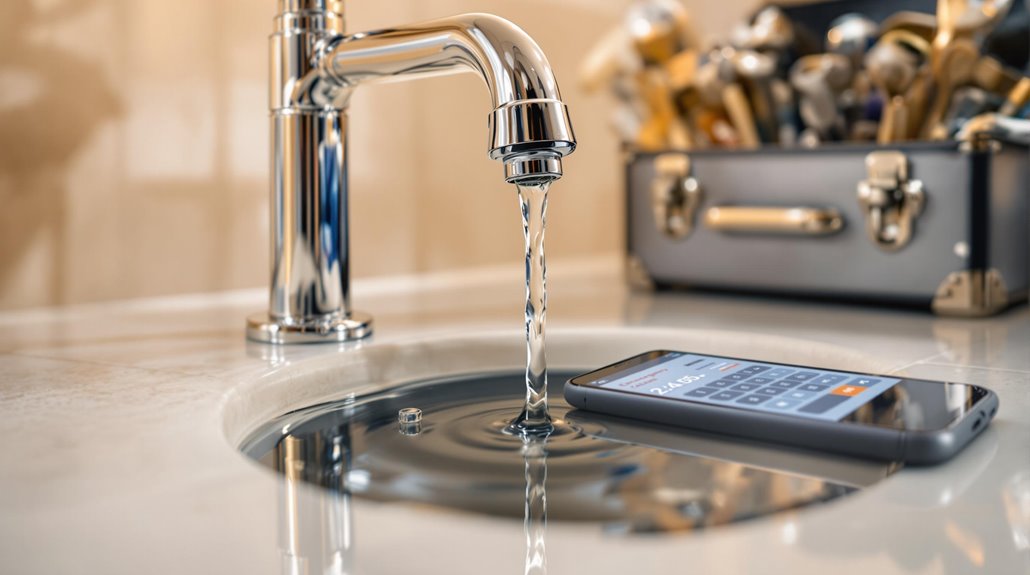Emergency plumber charges vary based on urgency, location, and problem complexity. Typically, initial service call fees range from $50 to $150. After that, hourly rates can be between $75 and $200, increasing to $200 to $350 for after-hours services, and up to $400 during weekends or holidays. Costs are likewise influenced by the plumber's experience and reputation. Additional materials or diagnostic fees may apply depending on the situation. Understanding these factors helps you prepare for costs during plumbing emergencies. There's more valuable information ahead that can guide you through managing your plumbing needs effectively.
Key Takeaways
- Emergency plumbing costs range from $50 to $150 for the initial service call, with hourly rates following between $75 and $200.
- After-hours emergency plumbing can escalate charges to $200 to $350 per hour, with weekend or holiday rates ranging from $250 to $400 per hour.
- Geographic location significantly impacts costs; urban areas charge more than suburban or rural locations for emergency plumbing services.
- Additional charges may apply for parts, specialized services, or diagnostic fees depending on the complexity of the plumbing issue.
- Preventive maintenance and prompt action on plumbing issues can help reduce the likelihood of costly emergency repairs.
Factors Affecting Emergency Plumbing Costs

When you find yourself in need of an emergency plumber, several factors can influence the overall cost of the service. The urgency of the situation typically dictates pricing; for instance, after-hours calls often incur higher rates. Furthermore, the complexity of the issue plays a significant role in the cost breakdown. Simple repairs may be less expensive compared to more complicated problems requiring extensive labor and parts. Geographic location likewise affects emergency plumbing costs; urban areas usually charge more than rural settings because of demand and overhead. Finally, experience level and reputation of the plumber can lead to varying rates, as seasoned professionals may charge premium prices for their expertise and reliability. Understanding these factors can help you make well-considered choices. Additionally, an emergency plumber's 24/7 availability ensures that you receive timely assistance whenever a plumbing crisis arises.
Typical Service Call Fees
When you call an emergency plumber, understanding the typical service call fees is essential. You'll encounter an hourly rate breakdown, which varies based on the plumber's experience and location, along with additional charges for parts or specialized services. Don't forget the emergency service premiums that can greatly increase your total cost, especially during off-hours or holidays. Additionally, many emergency plumbing services, like Flood Medics, offer 24/7 availability for swift emergency response.
Hourly Rate Breakdown
Although emergency plumbing issues can arise unexpectedly, understanding the typical service call fees can help you prepare for the costs involved. Here's a quick cost breakdown of what you might expect:
- Base Service Fee: Most plumbers charge a standard fee for arriving at your location, typically ranging from $50 to $150.
- Hourly Rate: After the initial service fee, expect hourly rates between $75 and $200, depending on the plumber's experience and the complexity of the issue.
- After-Hours Premium: If you call an emergency plumber during off-hours, you might face an additional charge, often 1.5 times the normal hourly rate.
Additional Charges Explained
Understanding the supplementary charges that can apply during an emergency plumbing service is vital for managing your overall costs. Typically, emergency plumbers charge a service call fee, which covers their travel and initial assessment. This fee can vary based on your location and the time of day. Moreover, you might incur charges for specialized equipment or materials needed to resolve your plumbing issue. If your problem requires extensive repairs, you could face unexpected expenses that exceed the quoted hourly rate. It's important to ask your plumber about these potential charges upfront to avoid surprises. By understanding these typical service call fees, you can better prepare for the financial implications of emergency plumbing situations.
Emergency Service Premiums
Emergency plumbing services often come with premiums that reflect the urgency and time of the call. Understanding these emergency service premiums can clarify potential pricing variations you might encounter:
- After-Hours Rates: Expect higher charges for services performed during evenings or weekends.
- Holiday Pricing: Plumbing emergencies on holidays typically incur significant surcharges.
- Complexity of the Issue: The nature of the emergency may influence the base service call fee, especially if specialized tools or skills are required.
Being aware of these factors can help you prepare for the costs associated with emergency plumbing. Always inquire about the specific pricing structure before engaging services to avoid unexpected charges.
Hourly Rates Explained

While you might expect to pay a premium for emergency plumbing services, the hourly rates can vary considerably based on factors such as location, time of day, and the plumber's experience. Understanding the cost breakdown helps you prepare for these expenses.
Here's a quick overview of typical hourly rates:
| Location | Hourly Rate |
|---|---|
| Urban Areas | $150 – $300 |
| Suburban Areas | $100 – $200 |
| Rural Areas | $80 – $150 |
| After Hours | $200 – $350 |
| Weekends/Holidays | $250 – $400 |
These rates reflect the urgency and expertise required for emergency plumbing, ensuring you're informed about what to expect when hiring a professional.
Additional Charges to Consider
When hiring an emergency plumber, you need to factor in various additional charges. These can include service call fees, hourly labor rates, and material costs. Understanding these expenses upfront will help you budget effectively for your plumbing emergency.
Service Call Fees
Understanding service call fees is vital, as these charges can greatly influence your overall plumbing costs. When you call an emergency plumber, be prepared for potential service call pricing, which typically includes:
- Initial Visit Fee: This covers the plumber's travel to your location.
- After-Hours Charges: Emergency service fees may apply if you require assistance outside regular business hours.
- Diagnostic Fees: If the plumber needs to assess the problem further, additional charges may incur.
These fees can vary considerably based on location and urgency. Always ask for a detailed breakdown before committing, so you know exactly what to expect. Being informed helps you budget effectively and avoid surprises when dealing with plumbing emergencies.
Hourly Labor Rates
Hourly labor rates for emergency plumbing services can greatly impact your overall costs. Typically, these rates range from $100 to $250 per hour, depending on factors like location and the plumber's experience. When you call for emergency plumbing, you might face higher labor costs during evenings, weekends, or holidays, as many plumbers charge a premium for off-hours work. Keep in mind that the time taken to diagnose and resolve the issue can influence the total expense. Moreover, some plumbers may charge for travel time, which can add to your overall bill. Understanding these labor rates will help you budget effectively and avoid surprises when the bill arrives. Always ask for an estimate before work begins to clarify potential costs.
Material Costs
Labor costs are just one part of the equation when it comes to emergency plumbing expenses. You'll likewise need to take into account material costs, which can vary greatly based on the specific issue at hand. Here's a cost breakdown of common material types you might encounter:
- Pipes: Copper, PVC, or PEX can greatly influence the total cost.
- Fittings: Connectors and joints vary in price depending on the material and size.
- Fixtures: Toilets, sinks, or faucets have different price ranges, impacting your overall bill.
Understanding these material types helps you anticipate the final charges. Always ask your plumber for a detailed estimate to confirm you're aware of all potential costs involved in your emergency repair.
Types of Plumbing Emergencies

When a plumbing issue arises unexpectedly, it can disrupt your day and lead to costly damage if not addressed quickly. Understanding the types of plumbing emergencies helps you respond effectively. Here are some common situations you might encounter:
| Emergency Type | Symptoms | Immediate Action |
|---|---|---|
| Burst Pipes | Water flooding | Shut off water main |
| Clogged Drains | Slow drainage | Use a plunger or snake |
| Overflowing Toilets | Water spilling | Turn off the toilet valve |
| Sewage Backups | Foul odors, gurgling | Avoid using plumbing fixtures |
| Gas Leaks | Smell of gas | Evacuate and call emergency services |
Other emergencies may include water heater failures, sump pump issues, faucet leaks, and toilet repairs. Address these problems promptly to minimize damage.
Average Costs by Location
Understanding the types of plumbing emergencies is just the first step; knowing the average costs associated with these urgent situations can help you prepare for unexpected expenses.
- Urban Areas: Expect costs to be higher because of regional pricing and increased demand for services.
- Suburban Regions: Prices are typically moderate, balancing accessibility and availability of emergency plumbers.
- Rural Locations: Costs can vary greatly, often being lower, but availability may be limited, impacting response times.
Location impacts not only the cost of services but also the availability of qualified plumbers. By recognizing these regional pricing differences, you can better anticipate expenses and make knowledgeable choices in a plumbing emergency.
Comparison With Regular Plumbing Services

While emergency plumbing services are essential for urgent issues, they often come at a premium compared to regular plumbing. Regular plumbing typically involves scheduled maintenance or non-urgent repairs, allowing for standard rates and potentially lower costs. Conversely, emergency plumbing usually incurs higher fees because of the immediacy of the situation and the likelihood of after-hours service. You might pay a markedly increased hourly rate for an emergency plumber, along with additional charges for travel and materials. Understanding this difference helps you prepare financially for unexpected plumbing crises, ensuring you're not caught off guard by the costs associated with emergency services. Ultimately, knowing the distinctions between these services can guide your decision-making in plumbing emergencies.
Tips for Reducing Emergency Costs
To minimize emergency plumbing costs, it's crucial to act quickly and efficiently when a crisis arises. Here are three effective tips to help you save money:
- Preventive Maintenance: Regularly inspect your plumbing system to catch potential issues before they escalate. Simple checks can save you from costly emergencies.
- DIY Repairs: Learn basic plumbing skills for minor issues. Tasks like unclogging drains or fixing leaks can often be tackled without professional help, reducing service calls.
- Keep Contact Information Handy: Have a list of reliable plumbers ready. Quick access can help you get estimates faster, allowing you to choose the best option without delay.
When to Call an Emergency Plumber

Knowing when to call an emergency plumber can save you from extensive damage and costly repairs. If you experience plumbing emergencies like severe leaks, overflowing toilets, or burst pipes, it's vital to act quickly. These situations can lead to water damage that may worsen over time. Furthermore, if you notice strange noises from your plumbing system or a sudden drop in water pressure, don't hesitate to seek urgent repairs. Delaying action can escalate minor issues into major problems, resulting in higher repair costs. Always keep your plumber's contact information handy for quick access during emergencies. By recognizing these signs early, you can protect your home and guarantee efficient, timely repairs.
Conclusion
Understanding emergency plumbing costs can feel like steering through a maze, but knowing the factors at play helps you make educated choices. By considering fees, hourly rates, and potential additional charges, you can better prepare for unexpected situations. Remember, while emergencies can be costly, there are ways to minimize expenses. When you find yourself in a bind, don't hesitate to call a professional—your home's plumbing is a crucial system that deserves expert care.
